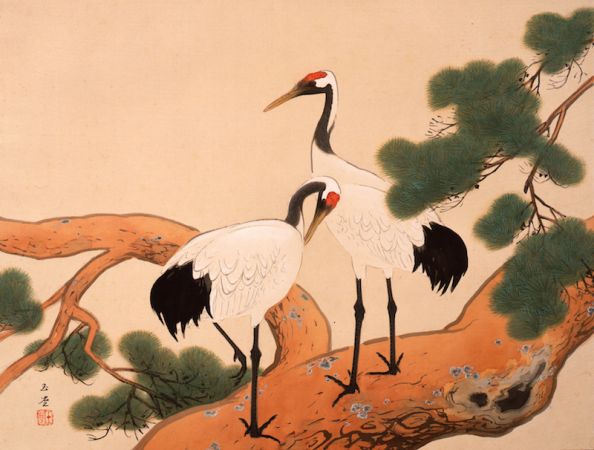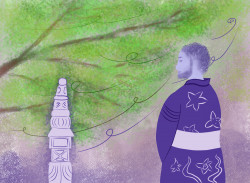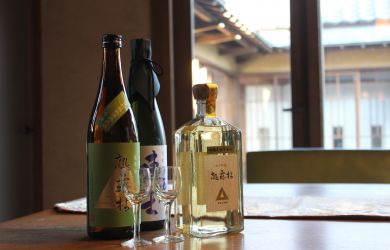
May 2, 2023
Fresh Ink: Love
The English-language debut of Kanoko Okamoto's piece, Love
All of the articles in our Fresh Ink series highlight the English-language debuts of never-before translated works of prominent Japanese writers. The English-language debut of Kanoko Okamoto’s piece, Love, is a translation from an original Japanese work in a posthumous collection of Okamoto stories.
by Kanoko Okamoto | translated by Eric Margolis
Kanoko Okamoto (1889-1939) was an acclaimed Buddhist scholar, feminist writer, and avant-garde poet in the 1910s, 20s, and 30s. She wrote lavish romantic poetry and essays that explored motherhood and sexuality.
Okamoto was best-known, and often criticized, for her over-the-top romantic sensibilities. This florid essay on falling in love is well representative of Okamoto’s voice. It is a far cry from the cynical, ironic, and disassociated representations of romance that are prevalent in 21st-century literature, and understandably so: her transcendental approach to love truly belongs to another era. But is there something we can take back from this work about the value of romanticism and passion?
“Love” was published in a posthumous collection of Okamoto’s work.
Until I met him, I never thought I would meet someone who strained me so much, who ground me to the bone. Upon reflection, I much prefer my unfussy everyday life, anxiously awaiting my 3:00 tea. While you might often think about the various phases of the human lifespan, from marriage to child-rearing to preparing for old age, you never wilfully decide to grow old. Thread slid easily through the eye of my sewing needle. The smooth lines of the tatami mat slid comfortably under my bare feet. I placed the yellow chrysanthemums I bought into the vase.
When I did meet that man, I had a hunch about him. I found myself foolishly wondering if today really was no more than today, and whether I myself was really no more than the person I was. Reflecting on that feeling made me feel all the more foolish. The contradictory impulses that ran through my breast flickered like late night neon. Restless advertisements, Ail-All Pills, Jintan. In the midst of it, something inside me said that I would see him again.
When I left the house, I dragged with me all the heaviness and intensity an encounter with him entailed. He came into my view, unexpectedly simple, pale. He brought to mind a soaked light blue color, just like pear tree flowers, the kind of color I knew I would not be able to ignore.
Carrying himself with great posture, he sat down on a chair. He drew his knee to his chest and placed some kind of musical instrument atop the knee. Then he began to play. At first, I could barely hear it. My mother had asked me to deliver his kimono, so I placed it on the desk by his side as he acknowledged me with his eyes. He then gestured for me to take a seat across from him, and resumed playing the instrument. He never spoke. But his gentle gaze shot out from his narrowed eyes, hitting the area around my heart as he played. At that moment, I began to suffer in the most peculiar way.
A river coursed within him, one that I was compelled to flow into. I began to chase after the flow. He seemed to be suddenly armored in a skin of faux-leather, coated in enamel that crackles when flicked. It was as if I was searching for an entrance into my own soul via his body. I was running around brimming with bitter, pained thunderbolts, sizzling needles pinpricking me where the electricity discharged all over. My confused soul moved me to face his lips, his forehead, and tempted me to go rushing straight at them. My soul continually slipped, fell, and wept, like cicadas in the depths of a night thrust away by bright lamps.
I withstood my suffering for some time, pressing my hands together and muttering some incomprehensible entreaty. Meanwhile, he retained his good posture, continued to cast his soft gaze from his narrowed eyes. He continued to play the music of an instrument I could hardly hear. I felt the fangs of my heart aim in his direction. To tear him apart.
When I came to my senses, it felt like I had successfully plunged into his stream, melted into his waters. I could no longer see the river. Had my body become the river? I swelled with some kind of vital power. I could go bursting into any valley I chose. A bright valley brimming with fragrance. I surpassed the hardships of marriage and aging.
If any other man were to touch me, I would crumble into smoldering ashes. Part of me yearned to tell all the men in the world. And yet that man—he continued as he was, playing his quiet music. Now I was gazing at him from within him, like an onlooker inside the Great Buddha. For the first time, I could hear the music clearly. It was a playful tune, like tumbling rapids. Returning back to my own body felt almost impossible. I would have to cross vast seas and mountains of loneliness.
To me, this miraculous person—a regular customer of my mother’s cheap sewing, a junior employee at a confectionery who walked around town selling biscuits—must have had riches far beyond his monthly salary.







